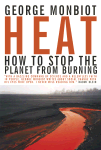

Back in September I talked about two non-fiction books that I was very interested in, This is my Country, What's Yours? by Noah Richler and Heat: How to Stop the Planet From Burning by George Monbiot. I have both of them now, and have been reading them. I thought instead of just posting about them all at once, I am going to talk about them as I go along. Why? Because I think both of them are very interesting books!
So, let's start with the Noah Richler book. It sort of vanished for a while, and I only found it yesterday. I am just about to start chapter 4, so not very far into it yet, but now that I know where it is, I am sure you will see me read more of it.
Anyways, the chapters have explanations about what they are about, so I will show you what I just read about:
Chapter One: The Virtues of Being Nowhere
In which the author, seeking to understand the psycho-geography of the country, travels to Iqaluit, Nunavut; Don Mills, Ontario; and Steinbach, Manitoba; encounters the novelists Margaret Atwood, Jane Urquahart, Colin McAdam, Barbara Gowdy, Lawrence Hill, Paul Quarrington, Lee Henderson, Wayne Johnston, Miriam Toews, M.G. Vassanji, Rohinton Mistry, and Douglas Coupland, and discovers Nowhere has three stages.
My Thoughts on the Chapter:
Awesome list of authors, I know who most of them are, so it was interesting to hear what they thought about "Nowhere". It's rather funny, in Canada, you can be pretty much anywhere and feel like you are in the middle of nowhere. It is just the way the country has built up. A very interesting chapter about living in Canada.
Part One: The Age of Invention
Chapter Two: Stories and What They Do
In which the author recalls a bygone conversation with the Ghanian novelist B. Kojo Laing that suggested that stories do battle, prompting him to wonder whether the novel is sometimes a bullying thing and to seek illuminations from the poet Robert Bringhurst in the woods of Quadra Island, B.C.
My Thoughts on the Chapter:
I learned a lot from this chapter. The author really travels to odd places. Before I get much further I need to get a map of Canada, because I don't know where all the smaller towns are.
Chapter Three: Igloolik, 1822
In which the author accepts an invitation from his friend John MacDonald to attend the Inuit Festival of the Return of the Sun in Igloolik, Nunavut, where he remembers a conversation he had in London with the anthropologist Hugh Brody and converses with several Inuit, including Leah Otak, Louis Tapardjuk, and the filmmaker Zacharias Kunuk, and discovers oral stories about First Contact that compel him to make the case that the novel served settlers' interests better than creation myths did the Inuit's.
My Thoughts on the Chapter:
This has been my favourite chapter so far, because while I know where Nunavut is, when I was in school and learning all about Canada, it was still part of the Northwest Territories, so I have never studied it when it is alone. Also, we discuss the Natives of Canada in great detail in school, still did in university, but we hardly ever talk about the Inuit. Just from this chapter I think I learned more about them than all my schooling. The Creation Myths and how technology has changed their way of life is very interesting.
Then, today, I plan to read Chapter Four:
Chapter Four: The Circle in the Square
In which the author travels to Inuvik, in the Northwest Territories; to Wanuskewin, Saskatchewan; around the city of Toronto, Ontario; and to Frace to meet the aboriginal storyteller Louis Bird, the poet Louise Halfe, and the novelists Robert Arthur Alexie, Eden Robinson, Tomson Highway, Joseph Boyden, and Lee Maracle, and discovers that in the hands of peoples it once helped oppress, the novel defends aboriginal culture, and becomes the exponent of a prior, contrary view of life.
The next non-fiction book that I am concentrating my time on is Heat. It is not out yet, sadly, so I am not allowed to say much about it. I was just wondering, what do you guys think about global warming? Do you think it is our fault or was going to happen anyways? Feel free to say whatever you want. Then, I think it is on the 17th, I will talk about what George Monbiot has to say on the subject. I just need to sort of talk about it or I will forget parts of it by the time I can post about it.
Anyways, if you are interested in either of these books, click here for Heat and here for Noah Ricler's novel. (Yes, I found it now, it is a McClelland book, not a Random House one. I should pay more attention to these things.)

No comments:
Post a Comment
Thanks for stopping by and commenting!
I am so sorry, but I turned anonymous commenting off. I have had it from the very beginning, but that is how the spam is getting by my spam filter at the moment. If it is a big deal I will turn it back on and moderate all comments. I also changed moderation from older than 14 days to older than 7.